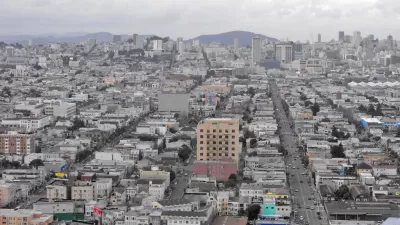At a packed, May 17 meeting in Oakland, filled with transit advocates, tea-partiers, and builders, leaders of the two regional planning agencies selected "Plan Bay Area" as the blueprint to reduce transportation greenhouse gas emissions 17% by 2035.
Michael Cabanatuan writes that "the strategy, approved by the governing boards of the Metropolitan Transportation Commission and the Association of Bay Area Governments... is the Bay Area's attempt to satisfy (the Sustainable Communities and Climate Protection Act of 2008, also known as) SB 375 that requires regions to reduce their greenhouse gas emissions" (from the transportation sector). This is the first step - an environmental review is due next.
The state Air Resources Board has assigned the Bay Area a reduction of greenhouse gas emissions of 7 percent by 2020 and by 15 percent by 2035.
"...the plan establishes a closer connection between housing and transportation planning. Cities and counties are not obligated to follow the plan, but money for transportation improvements would go to areas that adhere to it. But even though the plan is optional, it has generated great controversy, as was evident at Thursday's public hearing, which drew an overflow crowd of about 200 and inspired 70 people to wait for hours to speak."
Writing in the Contra Costa Times, Lisa Vorderbrueggen captures the sentiments of those most fiercely opposed to the plan.
"Property rights advocates assailed the "global climate myth" and the regional planning effort as an unconstitutional and treasonous act that will lead to dense "pack 'em and stack 'em" high-rise transit villages."
"Regionalism equals communism," East Bay Tea Party founder Heather Gass said.
MTC also describes other legislative adoptions that occurred on May 17 in their press release:
"The 'Preferred Land Use and Transportation Investment Strategy' is a key milestone in developing the final Plan Bay Area, which is due for adoption in April 2013. MTC also voted to approve the "One Bay Area Grants" (OBAG) program, and ABAG approved a draft housing allocation methodology for Bay Area cities."
Thanks to MTC Library
FULL STORY: Land-use plan calls for new growth near transit

Planetizen Federal Action Tracker
A weekly monitor of how Trump’s orders and actions are impacting planners and planning in America.

Maui's Vacation Rental Debate Turns Ugly
Verbal attacks, misinformation campaigns and fistfights plague a high-stakes debate to convert thousands of vacation rentals into long-term housing.

San Francisco Suspends Traffic Calming Amidst Record Deaths
Citing “a challenging fiscal landscape,” the city will cease the program on the heels of 42 traffic deaths, including 24 pedestrians.

Defunct Pittsburgh Power Plant to Become Residential Tower
A decommissioned steam heat plant will be redeveloped into almost 100 affordable housing units.

Trump Prompts Restructuring of Transportation Research Board in “Unprecedented Overreach”
The TRB has eliminated more than half of its committees including those focused on climate, equity, and cities.

Amtrak Rolls Out New Orleans to Alabama “Mardi Gras” Train
The new service will operate morning and evening departures between Mobile and New Orleans.
Urban Design for Planners 1: Software Tools
This six-course series explores essential urban design concepts using open source software and equips planners with the tools they need to participate fully in the urban design process.
Planning for Universal Design
Learn the tools for implementing Universal Design in planning regulations.
Heyer Gruel & Associates PA
JM Goldson LLC
Custer County Colorado
City of Camden Redevelopment Agency
City of Astoria
Transportation Research & Education Center (TREC) at Portland State University
Jefferson Parish Government
Camden Redevelopment Agency
City of Claremont



























